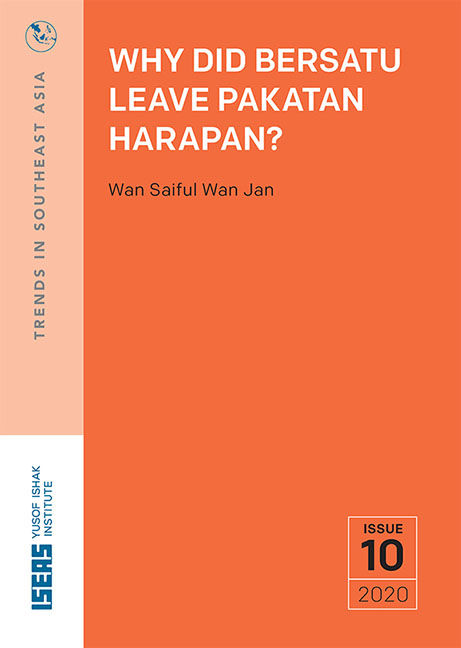Why did BERSATU Leave Pakatan Harapan?
Published online by Cambridge University Press: 17 December 2021
Summary
INTRODUCTION
Malaysia's Pakatan Harapan (PH) government lasted less than two years. After winning the 14th general election (GE-14) on 9 May 2018 to great fanfare, it crashed on 24 February 2020 following the sudden resignation of Prime Minister Mahathir Mohamad and the departure of Parti Pribumi BERSATU Malaysia (BERSATU) from the PH coalition. Many were surprised by Mahathir's move, but a closer look at the nature of PH and how their agenda was received by Malaysians—especially by the Malay bumiputra group—shows that trouble started brewing right from the beginning of its formation. The problems were never resolved and continued to simmer in the background throughout its short tenure.
Some have argued that PH was never truly stable as a government or as a coalition. Leaders from its component parties continuously and publicly bickered, creating a perception that they lacked cohesion. Once in government, PH also lost five of the ten by-elections that took place after GE-14, indicating that their grip on the country's imagination had eroded over time. PH was also unable to maintain popularity while in office, with their poll ratings plummeting as they entered their second year of administration.
Opinions differ as to why PH collapsed. This essay examines the topic from BERSATU's point of view, documenting why the party decided to leave the very coalition that brought them to power. Indeed, many have argued that it was wrong for BERSATU to leave PH, but so far none have sought to answer the question why the party chose such a controversial path. This essay is an attempt in that direction.
In conducting this research, this author interviewed several key leaders from all four PH component parties, some of whom are cited here. Relevant literature was reviewed to supplement the primary data gathered from the interviews as well as the author's personal observations. The author sits in the BERSATU Supreme Council and was involved in several high-level discussions related to the topic. As such, this essay also benefits from an insider perspective. At the same time, great effort has been made to avoid making a moral judgement on the decision taken by the party especially since, at the time of writing, sentiments are still running high.
- Type
- Chapter
- Information
- Why Did Bersatu Leave Pakatan Harapan? , pp. 1 - 44Publisher: ISEAS–Yusof Ishak InstitutePrint publication year: 2021



